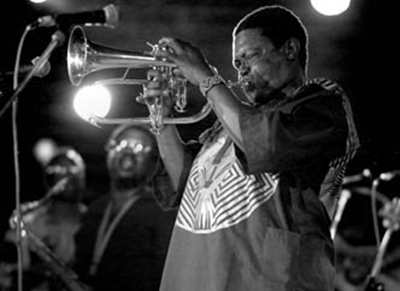This week: Makeba, Masakela and two giants of Cape Jazz…
As Andrew Marr noted in his recent, erm, ambitious History of the World, everyone on the planet can trace their DNA back to a single woman in Africa. Humanity’s most recent common matrilineal ancestor is known as Mitochondrial Eve (sadly she never met her male counterpart, Y-chromosomal Adam, who lived about 80,000 years later), but surely a much better moniker than that awkward mouthful would be ‘Mama Africa’.
Which funnily enough just happened to be the nickname of Miriam Makeba. She was born in Johannesberg in 1932 and shot to South African fame in the late 1950s with her blend of jazz and Afro melodies, particularly signature tune Pata Pata, which later became a hit in the USA. But she was also an active anti-apartheid campaigner, and in 1963 she had her South African nationality revoked. She then effectively became a ‘world citizen’, with honoury citizenship in ten countries and nine different passports. She didn’t return to her native country until 1990, when F W de Clerk reversed the ban on anti-apartheid organisations. Over the years she recorded with numerous stars including Dizzy Gillespie, Nina Simone and Harry Belafonte, and she featured on Paul Simon’s Graceland tour. Makeba died in 2008, suffering a heart attack after performing Pata Pata on stage in Italy.
Miriam Makeba was also married, for a couple of years anyway, to Hugh Masakela, possibly South Africa’s most famous musician, born in the Kwa-Guqa Township of Witbank in 1939 and not dead yet. Masakela’s DNA can be found in most of the strands of African jazz that follow, and like Makeba he’s a social campaigner – among other things, directing a charity providing free meals to Soweto township schoolchildren. This is Coal Train (‘Stimela’), live at the Clapham Common ‘Freedom Beat’ Festival in 1986….
In 1959 Masakela formed Jazz Epistles, a supremely popular ensemble that included Kippie Moeketsi on alto sax, Jonas Gwangwa on trombone and Cape Town-er Dollar Brand on piano. Dollar Brand would go on to convert to Islam, take on the name Abdullah Ibrahim and in the 1970s become the leading exponent of what is known as Cape Jazz. If I was to pick a single adjective to describe Cape Jazz, it would have to be ‘life-affirming’. Not happy as such – it often verges on plaintive – but positive about the fact of being alive. It is afternoon music (whereas most jazz is night-time music), bustling and vividly colourful. This is the title track of his 1985 album Water from an Ancient Well, very much at the plaintive end of the Cape Jazz spectrum…
To finish, one of Ibraham’s numerous Cape Jazz cohorts, self-taught alto-sax player Robbie Jansen. A popular figure in Cape Town, he played with all the greats but died in 2010 aged just 61, a victim of respiratory problems. This 2005 perfomance epitomises the simple, repetitive, colourful sound of Cape Jazz and should warm your bones on a cold December Sunday. Enjoy!












Wonderful listening. I find so much music from Africa to be uplifting and life affirming. Listening to Pata, Pata just made my day so much sweeter.
Glad you enjoyed, Toby. If you don’t own any Abdullah Ibrahim then the ‘Water from an Ancient Well’ album is highly recommended.